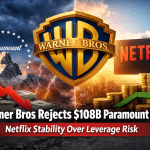Global wealth hit a fresh peak this year. Fresh data from the UBS Global Wealth Report 2025 shows that around 60 million adults now hold at least $1 million in assets. That figure marks roughly 1 in every 140 people worldwide. The number feels massive at first glance. Yet it pales against the razor-thin slice of true mega-wealth that sits at the very top.
Billionaires number just 3,028 globally according to the latest Billionaire Wealth Report. Among them only 18 boast net worths over $100 billion. Six push past $200 billion. And one lone figure eclipses $400 billion. These ultra-elites grip fortunes that dwarf entire economies. Their influence stretches from boardrooms to borderless markets. The contrast stirs a mix of awe and unease. It underscores how wealth clusters in pockets few can touch.
This disparity sharpened in recent months. The G20 Global Inequality Report released on November 2 revealed stark trends. Between 2000 and 2024 the richest 1% seized 41% of all new wealth created. That momentum shows no signs of slowing into late 2025. Everyday people feel the squeeze as housing costs soar and wages lag. The report paints a world tilting further off balance. It calls for urgent policy shifts to spread gains more evenly.

Musk buried in cash symbolizes the trillion-dollar Tesla windfall fueling his position as the World's richest person.
Why Mega-Wealth Feels Worlds Away
Hitting even $1 million to $5 million lands you in rare air. Globally that's a club most will never join. Each climb up adds layers of freedom. It shifts focus from scraping by to funding dreams like college for kids or a passion project. The emotional lift is profound. Suddenly life's guardrails feel sturdier.
Billionaires operate on another plane. Their $16.1 trillion collective haul rivals mid-sized nations' outputs. The top 10 alone could bankroll moonshot ventures from climate fixes to poverty lifts. All while leaving core stacks untouched. This power evokes quiet wonder. It hints at what focused capital might achieve if aimed right.
Yet the rarity bites. For billions scraping by the view from below stings. It sparks debates on fairness and fresh starts. The 2025 numbers don't just tally dollars. They map human hopes and the chasms between them.
Beyond the Numbers: What True Riches Unlock
Wealth transcends ledgers when it empowers real change. Millionaires gain breathing room for bold moves like angel investing in startups. That seed money sparks jobs and innovations rippling outward. The ultra-rich amplify it exponentially. Their endowments birth breakthroughs in medicine or clean energy. Legacies form not from hoarding but from deploying assets wisely.
The thrill lies in the possibilities. Imagine channeling gains into community hubs or global aid. It transforms cold figures into warm impacts. This vision inspires even as it humbles. In a year of record highs the call grows louder. Wealth should lift all boats not just yachts.
The Hidden Forces Driving Wealth Concentration
Wealth concentration boils down to a simple truth. A handful of players hold outsized sway over where money flows next. This setup amps up market swings because one big bet from a billionaire can jolt stocks or sectors overnight. Think of it as a game where a few heavy hitters call the shots. Their moves ripple out to everyone else's portfolios.
Recent insights from the G20 report add fresh urgency. That 41% capture by the top 1% fueled asset bubbles in tech and real estate. For average investors this means higher risks in familiar spots like retirement funds heavy on blue-chip names. Yet it opens doors too. Diversified plays in emerging green tech or global index funds can buffer the bumps. According to analysis reviewed by Finance Monthly these strategies helped everyday savers weather 2025's volatility spikes.
Ray Dalio founder of Bridgewater Associates captured the emotional weight last month. He warned that such gaps breed populist fires on both political flanks. "Growing wealth inequality is driving both left- and right-wing movements that threaten stability" Dalio said in a September interview. His words hit hard. They remind us this isn't abstract math. It's the fuel for real-world tensions that touch families and communities everywhere.
The payoff for grasping this? Smarter choices today. Start small with low-fee ETFs tracking broad markets. They spread risk without needing a fortune to enter. Historical data backs it up. Over the past decade such funds returned about 8% annually on average per Vanguard studies. Far from elite secrets these tools level the field just a bit. They turn daunting headlines into steps anyone can take.

From millions to billions: this image highlights how the ultra-rich accumulate and hoard wealth, emphasizing the vast financial divide on a global scale.
Wealth Wonders: What Readers Like You Are Asking
How Has the Number of Millionaires Changed in the Last Year?
The millionaire count surged to 60 million by mid-2025 up from 52 million at 2024's close. This jump tied to booming stock markets and real estate rebounds in key hubs like the US and China. UBS data shows about 680,000 new US dollar millionaires emerged alone. For everyday folks this signals opportunity in accessible investments. Yet it also highlights barriers like rising entry costs for property. The trend fuels optimism for savers who diversify early. It proves steady habits can bridge gaps over time.
What Percentage of Global Wealth Do Billionaires Control?
Billionaires command roughly 2% of total global wealth yet their $16.1 trillion slice packs outsized punch. The G20 report notes this elite tier grabbed 41% of new riches since 2000. That concentration sways policies from tax codes to trade deals. On the ground it means pricier assets for all. But savvy investors can counter by eyeing undervalued sectors like renewables. This dynamic underscores the need for balanced portfolios. It keeps personal finances resilient amid elite-driven shifts.
Could Redistributing Billionaire Wealth Fix Inequality?
Redirecting even a fraction of billionaire fortunes could slash poverty lines worldwide. Studies estimate $1 trillion in targeted aid might lift 700 million from extreme want per UN models. Emotional stakes run high as families eye fairer futures. Real hurdles include political will and efficient delivery. Philanthropy already channels billions yearly from names like Gates. For consumers the lesson rings clear. Support policies pushing transparency in giving. It turns distant debates into actionable advocacy right now.














